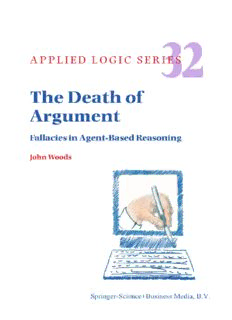Table Of ContentThe Death of Argument
APPLIED LOGIC SERIES
VOLUME32
Managing Editor
Dov M. Gabb ay, Department of Computer Science, King's College, London,
U.K.
Co-Editor
Jon Barwiset
Editorial Assistant
Jane Spurr, Department of Computer Science, King's College, London, U.K.
SCOPE OF THE SERIES
Logic is applied in an increasingly wide variety of disciplines, from the traditional subjects
of philosophy and mathematics to the more recent disciplines of cognitive science, compu
ter science, artificial intelligence, and linguistics, leading to new vigor in this ancient subject.
Kluwer, through its Applied Logic Series, seeks to provide a home for outstanding books and
research monographs in applied logic, and in doing so demonstrates the underlying unity and
applicability of logic.
The titles published in this series are listed at the end of this volume.
The Death of Argument
Fallacies in Agent Based Reasoning
by
JOHN WOODS
The Abductive Systems Group,
University ofB ritish Columbia, Vancouver, Canada
and
Department of Computer Science,
King's College, London, England
and
Department of Philosophy,
University of Lethbridge, Canada
Springer-Science+Business Media, B.V.
A C.I.P. Catalogue record for this book is available from the Library of Congress.
ISBN 978-90-481-6700-5 ISBN 978-1-4020-2712-3 (eBook)
DOI 10.1007/978-1-4020-2712-3
Printed on acid-free paper
All Rights Reserved
© Springer Science+Business Media Dordrecht 2004
Originally published by Kluwer Academic Publishers in 2004
Softcover reprint of the hardcover 1st edition 2004
No part of this work may be reproduced, stored in a retrieval system, or transmitted
in any form or by any means, electronic, mechanical, photocopying, microfilming, recording
or otherwise, without written permission from the Publisher, with the exception
of any material supplied specifically for the purpose of being entered
and executed on a computer system, for exclusive use by the purchaser of the work.
For their unstinting support, their love and endless good humour,
I dedicate this work to
Carol Woods
Catherine Armstrong
Kelly Woods
Michael Woods.
Contents
Dedication v
Preface xiii
Acknowledgments XVll
Prologue XIX
Part I Metatheoretical Questions
1. WHO CARES ABOUT THE FALLACIES? 3
1 Questions About Fallacies. 3
2 The Current State of Fallacy Theory. 5
3 Light At The End Of The Tunnel? 7
4 Their Importance. 12
5 Is That All There Is? 15
6 Critical Thinking 19
7 So What? 20
2. THE NECESSITY OF FORMALISM 25
1 Methodological Pluralism 25
2 Formal Logic 26
3 Nomic Systematicity 30
4 Technical Information 31
5 Theory and Practice 32
5.1 Massey 33
5.2 McPeck 34
5.3 McP**k 35
5.4 Scriven 35
Vlll THE DEATH OF ARGUMENT
6 Pedagogy 36
7 Conclusion 38
8 Appendix A 39
9 Appendix B 39
10 Appendix C 41
3. THE INFORMAL CORE OF FORMAL LOGIC 43
1 Artificial Languages 43
2 The Language of PC 45
3 The Utility of PC 48
4 The Irreducible Informality 49
5 Quantum Logic 53
6 Further Work for Informal Logic 55
7 Informal Theories of Implication and Consistency 60
Part II Threats and Intimidation
4. AD BACULUM AND PASCAL'S WAGER 65
1 The Standard Treatment 65
2 Prudential Argument 66
3 Case One: The Heist 67
4 Case Two: The Anti-smoking Commercial 67
5 Case Three: Pascal's Wager 68
6 Doxastic Surrender 69
7 Inaccessibility to Reason 70
8 The State, the Party and the Wager 71
5. APPEAL TO FORCE 75
1 Arguments From the Stick 75
2 Case One 76
3 Case Two 76
4 Case Three 76
5 Case Four: Risk A version Strategies 77
6 Case Five: The Stick-Up 78
7 Case Six: Negotiations 80
8 Case Seven: Veiled Threats 82
Contents ix
9 Practical Arguments 84
10 Ad Baculum Reasoning 86
10.1 Collective Bargaining 87
10.2 The Mugger 89
10.3 Anti-smoking Arguments 89
10.4 Utilities 90
11 Description of a Basic Model 91
11.1 Example 92
11.2 Example 92
11.3 Propositions 93
11.4 Actions 93
Part III Arguments Involving Reference to Persons
6. DIALECTICAL BLINDSPOTS 97
1 Not Practising What You Preach 97
2 Insincerity and Irrationality 99
3 Explanatory Opacity 104
4 Blindspots 106
5 Trust 107
7. AD HOMINEM 111
1 Johnstone to Locke 111
2 Aristotelian Refutations 112
3 Falsifying Refutations 118
4 Peirastic Refutations 120
5 Proof Ad Hominem 122
8. AND SO INDEED ARE PERFECT CHEAT 125
1 "Fallacies" that aren't Fallacies 125
2 Bias 126
3 Popular Appeals and Common Knowledge 131
4 Preconception and Dogmatism 137
4.1 Ad Verecundiam 138
4.2 Conservatism 139
4.3 Inconsistency 141
5 Doxastic Loyalty 144
X THE DEATH OF ARGUMENT
Part IV Pragma-Dialectics
9. PRAGMA-DIALECTICS 151
1 The Pragma-dialectical Approach 151
2 Difficulties 153
3 Unification 155
4 Prospects for Pragma-dialectics 156
10. BUTTERCUPS, GNP'S AND QUARKS 161
1 Theory-dependency 161
2 Fallacies 163
3 Moderate Dependency 165
4 Theory and Analysis 168
11. UNIFYING THE FALLACIES? 171
1 Theory Reductions 171
2 Exemplar Theory 174
3 VEG as Theoretical Stipulation 177
4 Reconciling WW and VEG 179
Part V Intractable Disagreement
12. STANDOFFS IN PUBLIC POLICY 185
1 Degrees of Standoff, Force I-III 185
2 Extremism 187
3 Dealing with Standoffs of Force Five 194
4 Education as Strategy: Persuasion and Thought Control 197
13. STANDOFFS AND DEMORALIZATION 201
1 Demoralization 201
2 Spinning 208
3 Witnessing 211
4 Privatizing the Good 212
5 Indoctrination 214
Description:The present work is a fair record of work I've done on the fallacies and related matters in the fifteen years since 1986. The book may be seen as a sequel to Fallacies: Selected papers 1972-1982, which I wrote with Douglas Walton, and which appeared in 1989 with Foris. This time I am on my own. Doug

